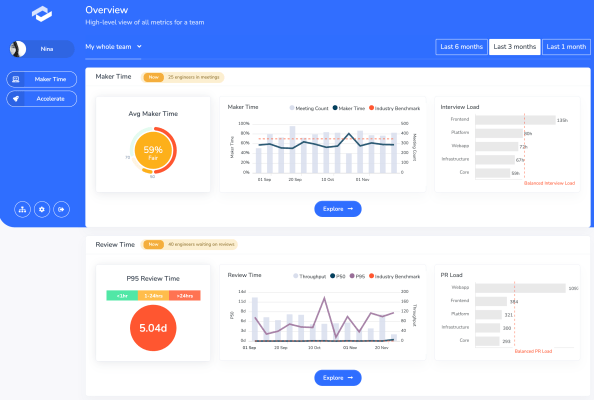
Amid the pandemic, workplace cultures have been turned on their heads, meanwhile investment and growth haven’t slowed for many tech companies, requiring them to still onboard new engineering managers even while best practices for remote management are far from codified.
Because of remote work habit shifts, plenty of new tools have popped up to help engineers be more productive, or quickly help managers interface with direct-reports more often. Okay is taking a more observatory route, aiming to give managers dashboards that quantify the performance of their teams so that they can get a picture of where they have room to improve.
The startup, which launched out of Y Combinator earlier this year, tells TechCrunch they’ve raised $2.2 million in funding led by Sequoia and are launching the open beta of their service.
Co-founders Antoine Boulanger and Tomas Barreto met while working at Box — Boulanger as a senior director of engineering and Barreto as a VP of engineering. They told TechCrunch that in the process of building out a suite of in-house tools designed to help managers at Box understand their teams better, they realized the opportunity for a subscription toolset that could help managers across companies. For the most part, Boulanger says that today Okay is largely replacing tools built in-house as well.
Getting a picture of an engineering team’s productivity means plugging into these toolsets and gathering data into a digestible feed. Okay can be integrated with a number of toolsets, including software like GitHub, PagerDuty, CircleCI and Google Calendar.
“Part of the problem for managers is that there are so many tools, so how do you get signal from the noise?” Barreto tells TechCrunch.
A large part of Okay’s sell seems to be ensuring that managers can keep an active eye on the common pitfalls of rapid scaling and keep them in check so that can keep direct-reports satisfied. On the individual basis, managers can quickly see stats related to how much of an individual manager’s time is being spent in meetings compared to un-interrupted “maker time” where they actually have the ability to get work done.
People don’t like to be micro-managed and the idea that everything you do is feeding into a pie chart that judges whether you’re a good employee or not isn’t the most savory sell for engineers. Okay’s founders hope they can strike a balance and give managers data that they’re not tempted to over-rely on, instead defaulting to team-level insights when they can so that managers are dialed into general trends like how long projects are taking on average or how long it takes for pull requests to be reviewed.
Investors have been bankrolling remote work tools at a heightened pace for the last several months and things have been especially fortunate for young companies that were ahead of the trend. Barreto, for his part, has served as a scout at Sequoia since 2018 according to his LinkedIn.
The team says their product, as it stands today, is best fit for companies with 50-200 engineers that are high-growth and perhaps going through some of those growing pains. The company’s early customers include teams at Brex, Plaid and Split.



